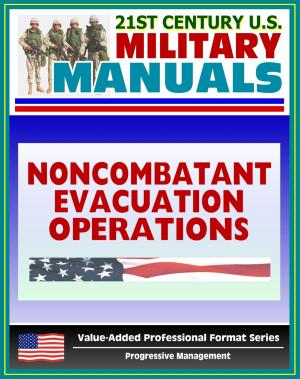Extending the Thin Blue Line: Constabulary Police Development in Phase Zero (Pre-Crisis Environment) Operations - U.S. Police in Germany 1945, Australian Police in East Timor and Solomon Islands
Nonfiction, Social & Cultural Studies, Political Science, Politics, Law Enforcement, History, Military, World War II| Author: | Progressive Management | ISBN: | 9781370996094 |
| Publisher: | Progressive Management | Publication: | February 11, 2017 |
| Imprint: | Smashwords Edition | Language: | English |
| Author: | Progressive Management |
| ISBN: | 9781370996094 |
| Publisher: | Progressive Management |
| Publication: | February 11, 2017 |
| Imprint: | Smashwords Edition |
| Language: | English |
This excellent report has been professionally converted for accurate flowing-text e-book format reproduction. After more than a decade of a war on terror, the United States Department of Defense has aggressively built foreign armed forces in an attempt to prevent the failure of struggling states, which often become safe havens for insurgent networks. In this quest to establish rule of law and legitimacy, the US government often focuses on strengthening host nation armies to promote internal and external security. Armies, however, do not experience the same degree of personal contact with a society, as does a police force. Ironically, police development is often an afterthought in nation building activity, in both preemptive and post combat stability operations. When proactive police development does occur, intergovernmental agencies or Special Operations Forces who lack practical policing experience and expertise often perform this task.
In counterinsurgency operations, the support of a local population is the enemy's center of gravity. In order to contain evolving terror and criminal networks in a Phase Zero environment, US statesmen and military leaders could deploy expeditionary US Army Military Police assets in conjunction with Special Operations Forces (SOF), the US Department of State, and other intergovernmental agencies to train and develop constabulary police forces in unstable states. This combined effort would result in capable and robust police forces that are able to offer local populations security and safety. More importantly, foreign police would earn the trust and confidence of vulnerable local nationals, who tend to seek protection from insurgent networks in volatile states. Building constabulary police forces in a peacetime atmosphere is a way to deter internal conflict and insurgency before a state fails and requires the deployment of combat arms organizations and subsequent rebuilding.
For the past decade, the United States Department of Defense (DoD) has developed host nation armies and police forces in Iraq and Afghanistan in attempt to establish stability and subsequent rule of law. These efforts are repeatedly ill timed, and terror networks often reach their climax before the point of military intervention. The French Army experienced a similar dynamic in Algeria in 1954. At this time, insurgency was reaching its apex, and the Algerian police force consisted of less than 50,000 capable uniformed officers. By the time that the French National Assembly granted the government the appropriate power to contain the emerging threats, most of the police, particularly its Muslim members, "had been engulfed in the chaos."
Conducting police development in Phase Zero or the "pre-crisis environment" of military operations would posture host nations to become more proactive instead of reactive in their quest to prevent insurgency by winning the support of the population.
This excellent report has been professionally converted for accurate flowing-text e-book format reproduction. After more than a decade of a war on terror, the United States Department of Defense has aggressively built foreign armed forces in an attempt to prevent the failure of struggling states, which often become safe havens for insurgent networks. In this quest to establish rule of law and legitimacy, the US government often focuses on strengthening host nation armies to promote internal and external security. Armies, however, do not experience the same degree of personal contact with a society, as does a police force. Ironically, police development is often an afterthought in nation building activity, in both preemptive and post combat stability operations. When proactive police development does occur, intergovernmental agencies or Special Operations Forces who lack practical policing experience and expertise often perform this task.
In counterinsurgency operations, the support of a local population is the enemy's center of gravity. In order to contain evolving terror and criminal networks in a Phase Zero environment, US statesmen and military leaders could deploy expeditionary US Army Military Police assets in conjunction with Special Operations Forces (SOF), the US Department of State, and other intergovernmental agencies to train and develop constabulary police forces in unstable states. This combined effort would result in capable and robust police forces that are able to offer local populations security and safety. More importantly, foreign police would earn the trust and confidence of vulnerable local nationals, who tend to seek protection from insurgent networks in volatile states. Building constabulary police forces in a peacetime atmosphere is a way to deter internal conflict and insurgency before a state fails and requires the deployment of combat arms organizations and subsequent rebuilding.
For the past decade, the United States Department of Defense (DoD) has developed host nation armies and police forces in Iraq and Afghanistan in attempt to establish stability and subsequent rule of law. These efforts are repeatedly ill timed, and terror networks often reach their climax before the point of military intervention. The French Army experienced a similar dynamic in Algeria in 1954. At this time, insurgency was reaching its apex, and the Algerian police force consisted of less than 50,000 capable uniformed officers. By the time that the French National Assembly granted the government the appropriate power to contain the emerging threats, most of the police, particularly its Muslim members, "had been engulfed in the chaos."
Conducting police development in Phase Zero or the "pre-crisis environment" of military operations would posture host nations to become more proactive instead of reactive in their quest to prevent insurgency by winning the support of the population.















